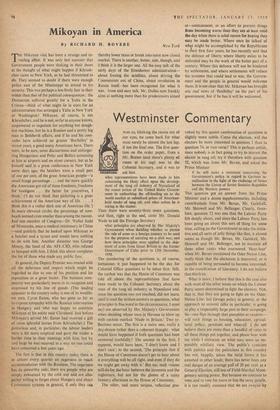Mikoyan in America
By RICHARD H. ROVERE New York rTHE Mikoyan visit has been a strange and re- ", vealing affair. It was only last summer that Government people were shaking in their shoes at the thought of what might happen if Khrush- chev came to New York, as he had threatened to do. They seemed to doubt if there were enough police east of the Mississippi to attend to his security. This was perhaps a less lively fear in their minds than that of the political consequences : the Democrats suffered greatly' for a Yalta in the Crimea—think of what might lie in store for an administration that arranged a Yalta in New York or Washington! Mikoyan, of course, is not Khrushchev, and he is not, so far as anyone knows, empowered to negotiate for anything but dough- nut machines, but he is a Russian and a pretty big man in Bolshevik affairs, and if he and his com- rades have achieved no greater `flexibility' in recent years, a good many Americans have. There were, to be sure, some discourteous and unforget- ting Hungarians and Poles and Baltics screaming at him at airports and on street corners, but as he himself said in a press conference in New York some days ago, the hecklers were a small part of one per cent. of the great American people—`a small fringe percentage . . . and the more quickly the Americans got rid of those freedoms, freedoms for hooligans . . . the better for yourselves, I think.' ('1 do not think that picketing is a great achievement of the American way of life. . . . I think this is a rather dark side of American life.') In more elevated circles the percentage of sore- heads seemed even smaller than among the masses. Just one member of Congress—Dr. Walter Judd of Minnesota, once a medical missionary in China —said publicly that he looked upon Mikoyan as a butcher and a tyrant and would have nothing to do with him. Another dissenter was George Meany, the head of the AFL-CIO, who refused to banquet with him. I think this about completes the list of those who made any public fuss.
In general, the DepUty Premier was treated with all the deference and respect which might be regarded as due to one of his position and his reputation as a great trader. The business, com- munity was particularly warm in its reception and impressed by his line of goods. (The leading appeaser in the country today is one of its wealthi- est men, Cyrus Eaton, who has gone so far as to express sympathy with the Russian intervention in Hungary and who was happy to entertain Mikoyan at his estate near Cleveland. Just before Mikoyan's arrival Mr. Eaton had received a gift of some splendid horses from Khrushchev.) The politicians and, in particular, the labour leaders were a bit more sceptical and gave the trader a harder time in their meetings with him, but by and large he was received in a way no one could have conceived a few years ago.
The fact is that in this country today there is in almost every quarter an eagerness to reach accommodation with the Russians. The eagerness has its unworthy side; there are people who are simply exhausted by the cold war and are alto.. gel her willing to forget about Hungary and about Communist tyranny in general, if only they can thereby lower taxes or break into some now closed market. There is another, better, side, though, and I think it is the larger one. All the easy talk of the early days of the Eisenhower administration— about freeing the satellites, about driving the Communists out of China, about revolution in Russia itself—has been recognised for what it was: loose and easy talk. Mr. Dulles now frankly aims at nothing more than his predecessors aimed at—containment, or an effort to prevent things from becoming worse than they are at least until the day when there is solid reason for hoping they may be made better. Where once he talked of whit might be accomplished by the Republicans in their first four years, he has recently said that the defence of liberty where liberty exists to be defended may be the work of the better part of a century. Where this defence will not be hindered by settlements, and where settlements will reduce the tensions that could lead to war, the Govern- ment and the people in general would welcome them. It is not clear that Mr. Mikoyan has brought any real news of 'flexibility' on the part of his government, but if he has it will be welcomed.










































 Previous page
Previous page